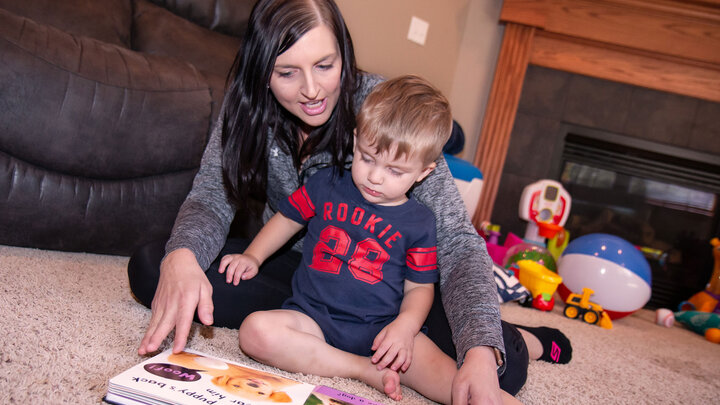Early language development is considered crucial for children’s school readiness and, ultimately, their reading success. But there are gaps in understanding what classroom features best support children’s language skills as they transition to school.
Rachel Schachter, assistant professor of Child, Youth and Family Studies, is working with researchers from The Ohio State University to explore how prekindergarten children’s early language gains predict their kindergarten readiness and later reading outcomes, as well as which early childhood classroom factors and practices enhance those gains.
The project is part of a collaborative, multi-institution research initiative funded by the Institute of Education Sciences. Clariebelle Gabas, Nebraska postdoctoral researcher, is also working with Schachter on the project.
“We know language skills are important, but most of the research on reading has not focused on language, but on other components of literacy,” said Schachter, a CYFS research affiliate. “We’re trying to understand how these language skills predict their kindergarten readiness and reading outcomes, then think about that in contrast to other emergent literacy skills.”
Researchers are using a novel approach to investigate malleable language practices. The project comprises five interrelated studies, using a variety of quantitative and qualitative methods. This includes reanalyzing an existing IES-funded dataset collected from a sample of about 2,000 children in 490 Ohio early childhood classrooms. This will be complemented with additional data collected during the project.
The first study uses data gathered from kindergarten readiness scores, classroom observations and various prekindergarten child assessments to determine how language scores contribute to long-term reading outcomes. In a second round of studies, classroom data will be examined to identify factors associated with children’s language gains.
For the study’s final stage, Schachter will partner with the Ruth Staples Child Development Lab, the UNL Children’s Center, Educare Lincoln and Winnebago to recruit a new sample of teachers whose children have made above-average language gains. Additional data will be gathered through educator interviews and classroom observations.
Schachter and the team aim to pinpoint the unique set of language skills children acquire in kindergarten and third grade classrooms, and explore what happens in the classroom that supports those language gains.
“There are a multitude of factors that could be affecting practice,” she said. “We are taking a comprehensive look to inform the field of what matters for supporting children’s language in early childhood classrooms.”
Schachter noted that until third grade, children learn how to read. After third grade, children begin reading to learn.
“You have to be able to understand your social studies or science text to be able to learn the content of the social studies or science instruction,” she said.
Schachter expects the study to provide a better understanding of early childhood classrooms and factors that can support language development. She also believes the project will help generate better mechanisms for studying classrooms and language, and crafting language supports within early childhood classrooms.
“The goal is to improve outcomes for children,” she said. “This can come from developing effective interventions, professional development opportunities, and policy and systematic initiatives to support improved language and long-term reading outcomes.”
College of Education and Human Sciences




